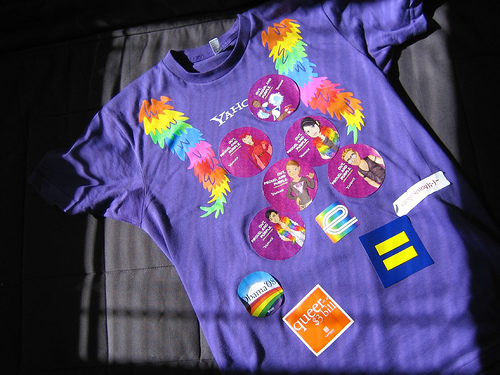Proud of what, exactly?
This weekend was my first Pride weekend in San Francisco, and as is customary around this time, one stops to think about the whole concept of being "proud" of one's sexuality. What's it about, really?
For one thing, having a big parade where everybody goes overboard with stereotypes -- dykes on bikes, muscle marys, leather daddies, drag queens and twinks -- doesn't exactly send the right message about what queer people are really like. Of course, a parade that accurately represented queer people would be 90% completely ordinary people, and that would make for a pretty dull parade ("...and here come the gay accountants!").
For another, having a big parade where people go over the top to show how WONDERFUL it is to be queer smacks a little of over-compensation. There is no reason life as a queer person cannot be absolutely as fun, fulfilling and happy as life as a straight person can be. Going on endlessly about how fabulous it is, disparaging comments about how straight sex must be boring and how unlucky the "breeders" are, and how we are so much better at throwing a party than the straights are may not be helping get across that message. Pretending being queer is better detracts from the sincerity of the truth that it is truly the same.
Pride also has the unfortunate side-effect of reinforcing the notion that queer people are defined by their sexuality above all other things. For me, the fact that I'm gay is important in that's it's shaped my life and my choices and says a lot about my background. I won't deny that I talk about it a lot. But it's roughly on a par with my nationality (which I also mention a lot). Before I am either gay or Trinidadian I'm a geek and a socialist and an intellectual snob and an arrogant bastard with a serious weakness for exaggeration, and all of those things have a lot more bearing on my day-to-day interactions with people. If you talk to me online* you're much more likely to find out those other things first**.
But while it's true that it's just as possible to have a happy, fulfilling life whether you're gay or straight or any other combination of gender and orientation you find yourself saddled with, the truth is that it's harder if you're queer. Sometimes it's little things, like wondering if the guy you're about to hire is going to become impossible to work with once he finds out. Sometimes it's big things, like hearing that the majority of the public would rather you weren't able to marry the person you love. If you're not lucky enough to live in a liberal society, sometimes it's really big things, like worrying that the police will catch you and your boyfriend and have you executed. Straight people generally don't need to consider the legality of their sex lives when planning a holiday.
Most of the reasons it's harder lie in unequal treatment in law and social stigmatization***, and -- as the last 40 years have so dramatically shown -- those things can be changed, sometimes very rapidly. And that's why Pride is still important as a movement. Even if all you want to do is live within ordinary boundaries, you have to push them a little further than you intend to go so that you're not hemmed in. You need radical feminists, so that ordinary feminists can get on with their lives without anybody calling them "baby" (unless they feel like it).
So my support for Pride, while nuanced, remains firm. Even if I only get around to it once a year, I still have a duty to push back the boundaries a little further so there's room for everyone.
I will even tolerate the silly rainbows.
* i.e. via a medium in which my fashion choices and voice would not be able to tip you off. I dispute the voice thing though.
** although you may have to spend some quality time with Wikipedia and a chat log before you work out the last one, as I'm pretty good at bullshitting to support a point. That's why I have a blog.
*** the remainder are to do with the hassle of working out if someone's gay (instead of being able to assume they're straight). But even most of that can be chalked down to social stigma making it tricky to just ask "hey, do you like boys?".

